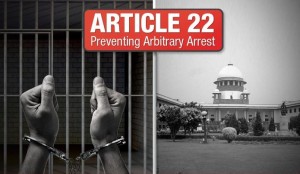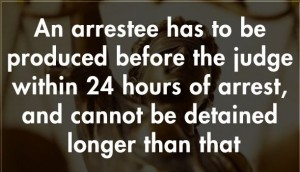In this Blog Post, Sakshi Bhatnagar, a student of National Law University Odisha, Cuttack writes about the controversial provision of preventive detention and ponders upon the question of whether the legislative intent for enacting the provision and the method of implementation of this provision are in sync with each other.
The Indian Constitution, just as other constitutions of the world, provides certain rights to the Indian citizens regarding their freedom, to protect themselves and their property, to put forward their opinions and views on and matter etc. at times, the individual liberty crosses the limits and threatens the very existence of the State and at that point of time it fails to control the enjoyment of individual’s liberty. The framers of the Constitution were aware of the fact that these freedoms can be used by the individuals in an unlawful manner, to achieve their selfish interests and sometimes even to cause harm to others. Hence, certain clauses which mainly aimed at preventing such a situation were inserted in the Constitution. These clauses act as limits which restrict the application of these rights in a law full manner so that one’s actions do not harm others. The law of Preventive Detention is one of such preventive measures which acts as a restriction on the unlawful use of the freedoms provided under the Constitution.
The Black Law Dictionary describes Preventive Detention as confinement generally imposed on a defendant in a criminal case who has threatened to violate the law while awaiting trial or disposition or of a mentally ill person who may harm himself or others. Hon’ble Supreme Court of India has defined this term as an anticipatory measure and has stated that it does not relate to an offense while criminal proceedings are to punish a person for an offense committed by him.[1]
In the pre-independence era, preventive detention was used by the British regime as a tool to establish a strong foothold in India. After independence, the laws relating to Preventive Detention were enacted by the provincial legislatures, and the hopes of the freedom fighters were shattered when this measure was immediately put into force after the commencement of Indian Constitution at the central level. The Preventive Detention Act, 1950 was altered thrice, aiming to provide increased protection to the person detained under the Act. The Act enacted in the year 1950 came to an end in the year 1969 but sadly after that, no vacuum was created in this area. Presently, the Constitution confers on the Parliament the power to make law with respect to preventive detention for the reasons connected with defence, foreign affairs, or national security and the persons subjected to such detention, by the virtue of Entry 9 of List I. these are the grounds upon which the very existence of the nation is based and thus giving Parliament exclusive authority in this regard can be said to be justified. A similar kind of authority was provided to the Federal Legislature by the Government of India Act, 1935.
Further, Entry 3 of List II provides concurrent power on Parliament and the state legislatures to make laws relating to preventive detention in respect of the security of the State, maintenance of public order or maintenance of supplies and services essential to the community and persons subjected to such detention. It is not out of the place to mention here that this sometimes causes tension between the central and state legislatures as the provinces and states may not pass such a law suit where their rights and liberty and interests are to be sacrificed. There was a difficult situation in the country just before the commencement of Constitution, and there were diverse preventive detention laws passed by the provincial legislatures as the Government of India Act of 1935 also provided power to the provincial legislatures on preventive detention regarding maintenance of public order.[2]Thankfully, the current Constitution is an improvement of the 1935 Act and does not give any such exclusive power to state legislatures in this connection.
There is no doubt that as per the present Indian legal system, the preventive detention is the most contentious part of the fundamental rights and “if a person is arrested or detained under a law providing for preventive detention, then the protection against arrest and detention under Article 22(1) and (2) shall not be available”.[3] “The object of Preventive Detention is not to punish but to intercept to prevent the Detent from doing something prejudicial to the State. The satisfaction of the concerned authority is a subjective satisfaction in such a manner”.[4]
A layman often confuses the concept of preventive detention with that of punitive detention. There is always need to carefully distinguish the two concepts. Preventive detention is used as a measure of a crime that is likely to happen, but the punitive detention is punishment for illegal acts already committed. Hence, the basic distinction is that Preventive Detention is taken on the grounds of suspicion that some wrong act may be done by the person concerned.
Grounds of preventive detention
Article 22 provides safeguards relating to preventive detention under clauses (4) to (7). Preventive detention is resorted to in the following circumstances:
- Security of state
- Maintenance of public order
- Maintenance of supplies and essential services and defense
- Foreign affairs or security of India
These grounds seem alike from the perspective of a layman’s understanding as for an ordinary person; it is not easy to differentiate between these terms. A common man cannot distinguish between the security of state and maintenance of public order or law and order. All these terms seem synonymous to an ordinary citizen of India. Thus judiciary’s role holds a prominent position while differentiating these concepts.
As regards to the ground of maintenance of public order is concerned, the judiciary has placed the cases of injuring an individual with knife[5], causing assault to one individual and inflicting grievous injury to his right leg[6], causing undue harassment to respectable young ladies[7], shouting slogans like ‘Naxalites Zindabad,’ ‘Long Live Revolution’ and ‘Mao Tse Tung Zindabad’[8] etc. the important point to be noticed here is that these grounds lack any direct relation to the maintenance of public order, and still they have been dealt by applying the law of preventive detention. Commenting on the most debated difference between ‘security of the state,’ ‘public order’ and ‘law and order,’ Chief Justice Hidayatullah stated that security of the state is a narrower concept and public order. State security forms the part of the inner circle and then comes the public order. The outer circle consists of law and order.[9] This distinction holds an eminent position in the law, but the demarcating line gets blurred when it comes to some cases such as; when a person commits assault or murder of another person. Such as case is mainly concerned with the problem of maintaining law and order but it adopts a communal element when committed in a public place, leading to chaos in the society and disturbances in the community. When this happens, the case comes under the purview of maintenance of public order.[10] This overlapping, arising out of such circumstances gives the executive a free hand in controlling the law and order problem in the name of maintenance of public order by extra-ordinary measures. Under such situations, it may be suggested that maintenance of public order should be scrapped as a ground of preventive detention just as in England[11], The United States of America[12], Australia[13], and Pakistan[14].
When it comes to the security of a state, it is vulnerable to be threatened by war, external aggression or internal disturbance. This it ultimately affects the security of the country. And thus, it is covered separately in List III, Entry 3. This view is also backed by judicial decisions where persons were detained on the ground of security of a state.[15] Now when we talk about maintenance of supplies and services essential to the community as a ground of preventive detention, the view of the judiciary is that it could be covered under the ground of defense of the country and hence, the defense power of the Parliament can be extended to control it.[16]
The Question Arises:
On a study of the laws of Preventive Detention in India, it can be seen that all the grounds mentioned above are included in one single legislation. The question thus arises is that how far is it justified? These grounds are covered by a single legislation by the virtue of The Preventive Detention Act, 1950 and the Maintenance of Internal Security Act, 1971, which directly provides the executive with a wider range of power to implement this extraordinary measure. In the case of executive action effecting preventive detention on two grounds, Hon’ble Supreme Court of India quashed the detention order on the ground that in the light of detention on two disjunctive grounds the authority making the detention order failed to apply its mind which was required by the Act.[17] In cases of preventive detention, the most valuable right of a person i.e. the right of personal liberty is at stake and thus there arises a need for the legislature to carefully and scrupulously enact a law relating to preventive detention.[18]
Extended Scope:
the original law has an attempt to cover all possible cases that could arise. But with time, both legislature and executive have extended the scope of preventive detention as a measure against unlawful activities. For instance, to curb the smuggling activities and to protect foreign exchange, the Parliament passes the Conservation of Foreign Exchange and Prevention of Smuggling Activities Act, 1974. The Act aimed at ensuring the security of state but the activities covered by the Act cannot be said to have a direct and immediate effect on the security of the state. The scope of Preventive Detention was also extended to control social boycott and excommunication[19], price control[20] etc. But the judiciary expressed its views against the executive action of trying to control food adulteration through preventive detention with an aim to maintain supplies and services essential to the community.[21] There were even suggestions to implement preventive detention laws for the prohibition of untouchability, evasion of taxes, etc. But such socio-economic issues ought not to be dealt with by using this extraordinary measure merely because the State failed in solving a problem.
Rights of Detente and Grounds
As the measure of preventive detention severely affects the social and personal situations of the detent, certain rights have been given to the person detained under this law so as to prevent infringement of his/her fundamental rights. Article 22(5) can be understood in two parts. First is that the detaining authority has to communicate to the detained person on what grounds he has been detained. Secondly, it is the obligation of the detaining authority to ensure that the detained person is afforded the earliest opportunity of making a representation against the order of detention.
Disclosure of the Grounds of Detention to Court
The laws laid down under the Preventive Detention Act, 1950 by the virtue of Section 14 were very strongly retaliated in the matter of Gopalan vs. State of Madras[22] On the ground that it infringed all the principles of natural justice and also the rights provided by Article 22(5) of the Constitution. It was held by the Court that such a provision was allowed to stand as it could lead to a situation where there would be no material before the Court to determine whether the detention was legal or not, irrespective of the fact that whether the impugned grounds were sufficient or not.
Relevant Ground
For a ground to be a relevant one, it must have a rational connection with the object which is to be ultimately prevented from happening. For instance, in the case of Puranlal Lakhanpal vs. Union of India[23], the aim of the appellant’s detention was to prevent him from acting in a manner prejudicial to (i) the security of India and (ii) her relations with foreign powers. The ground in the question was that the appellant had addressed a press conference that was attended by a large body of correspondents of the press of various foreign countries and making a speech that contained several false statements about the conditions of the people of Kashmir. Such a ground was considered relevant and to have a rational connection to prevent the activities prejudicial to the security of the country and foreign relations.
Vague Ground
While delivering judgment in the case of State of Bombay vs. Atma Ram[24], The Apex Court commented on the term ‘vague’ and stated that it can be considered as the antonym of ‘definite.’ If the supplied ground is incapable of being comprehended and understood or defined with sufficient certainty, it can be called vague.
In Ram Krishan vs. the State of Delhi, the Court ruled that a layman who is not experienced in the interpretation of documents could hardly be expected, without legal aid, to interpret the grounds in the proper sense. Hence, it is the responsibility of the detaining authority to make his meaning clear beyond doubt. If this is not done and the situation is handled otherwise, such grounds would lead to a violation of fundamental rights and freedom of the person so detained and thus they will be vague.[25]
Conclusion
To sum up the circumstances around the Preventive Detention laws of the country, it can be said that definitely the intentions of enacting such a law is to prevent the anti-social elements from causing hindrances in the society which might lead to harmful effects on lives of citizens, but these laws have to be applied with utmost care and precaution so as to avoid any controversy. These laws directly affect the fundamental rights and freedoms of people who are guaranteed by the primary source of law in India i.e. the Constitution of India and the complexities arising out of the irresponsible implementation of these laws can consume a lot of time of the judiciary and life of the person so detained.
[1]Alijan Mja vs. District Magistrate, Dhanbad, AIR 1983, SC 1130
[2]See the Assam Act, 1947; Bengal Act,1948; Orissa Act, 1948
[3]Art. 22(3), The Constitution of India, 1950
[4]Ankul Chandra Pradhan vs. Union of India, AIR 1997 SC 1284
[5]Sudhir Kumar vs. Police Commissioner, Calcutta, AIR 1970 SC 814
[6] P. Mukherjee vs. the State of W.B., AIR 1970 SC 852; Manu Bhusan vs. State of W.B., AIR 1973 SC 295
[7]Arun Ghosh vs. the State of W.B., AIR 1970 SC 1228
[8]Sundara Rao vs. State of Orissa, AIR 1972 SC 739
[9]AIR 1970 SC 1228, 1230
[10]ArunThis vs. the State of W.B., AIR 1966 SC 1925
[11]The Defence (General) Regulations, 19369
[12]The Internal Security Act,1950
[13]The War Prevention Act, 1914
[14]Schedule III, Entry 43, The Constitution of Pakistan
[15]JaganNathSahu vs. Union of India, AIR 1960 SC 625; Shyamlal Mondal vs. the State of W.B., AIR 1971 SC 2384
[16]Sec. 3(23), The Defense of India Act, 1962
[17]Kishori Mohan vs. the State of W.B., AIR 1972 SC 1949
[18]Preventive Detention in India: Experiences and Some Suggested Reforms, C.M. Jariwala
[19]Shamrao vs. District Magistrate, AIR 1952 SC 324
[20]Mishrilal Jain vs. District Magistrate, Kanpur, UR (SC) 1972, 100, 102
[21]Misrilal vs. State, AIR 1971 Pat. 134
[22]AIR 1950 SC 27
[23]AIR 1958 SC 163
[24]AIR 1951 SC 157
[25] AIR 1953 SC 318
 Serato DJ Crack 2025Serato DJ PRO Crack
Serato DJ Crack 2025Serato DJ PRO Crack













 Allow notifications
Allow notifications


